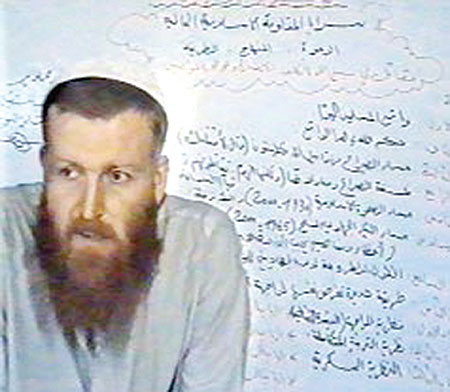
The Syrian government has freed a dangerous al Qaeda leader and strategist who was captured in Pakistan in 2005, released to the US, and then transferred to Syria in 2006, according to Internet jihadists at a prominent al Qaeda-linked forum.
A “prominent member of the jihadist forum community” claimed that earlier rumors of the release of Mustafa Setmariam Nasar, who is better known as Abu Musab al Suri, from a Syrian prison sometime last year are true, according to a translation of the message by the SITE Intelligence Group. The Internet jihadist’s message was posted on the Shumukh al-Islam forum on Feb. 2, and was endorsed by the forum’s administrators.
Al Suri’s release has not been confirmed. US intelligence officials contacted by The Long War Journal would not comment on the reports of his release.
He was first reported to have been released by Syrian’s security services along with his deputy, Abu Khalid, in late December 2011, by the Sooryoon Syrian news website. Internet Jihadists debated his release in mid-January. The reason for his release was not given.
Al Suri, a Syrian who is a Spanish citizen by marriage, is a longtime jihadist whose involvement in the global jihad has spanned four decades. He has extensive ties to the Muslim Brotherhood, the now-defunct Algerian Armed Islamic Group (GIA), the Taliban, al Qaeda, and other local and international terror groups.
In the early 1980s, he joined the Syrian Fighting Vanguards, an Islamist group involved in the uprising in Hama in 1982. He spent time in Europe after the failed uprising, then traveled to Peshawar and met Abdullah Azzam, Osama bin Laden’s mentor and the co-founder of al Qaeda. Al Suri served as a military trainer for foreign fighters who battled the Soviet Union and the Communist regime in Afghanistan. In the mid-1990s, he served as an editor for a GIA-linked jihadist magazine along with Abu Qatada, the radical cleric who is considered to be al Qaeda’s ambassador to the United Kingdom.
Al Suri returned to Afghanistan in 1997 and worked as a military trainer at al Qaeda’s notorious Darunta camp, where the terror group experimented with chemical weapons. In 2000, he established the Al Ghuraba training camp near Kabul. The camp was established under the aegis of the Taliban’s Ministry of Defense. In 2004, the US State Department issued a $5 million reward for information leading to his capture, and said that al Suri “trained terrorists in poisons and chemicals” at both Darunta and Al Ghuraba.
He was a prolific writer on strategy, and has been the main advocate of so-called “leaderless jihad,” which urges Muslims to establish their own cells without linking up with al Qaeda’s global network, in order to escape detection. Al Suri advocated that jihadists use the Internet and other methods to gather their information to conduct attacks.
Spain has sought al Suri for his connections to two terrorist attacks: the 1985 bombing at a cafe near Madrid that killed 18 people; and al Qaeda’s March 11, 2004 bombings on trains and at stations in Madrid that killed 191 people.
Al Suri was captured in Quetta, Pakistan, in November 2005 and transferred to US custody shortly afterward. He is said to have been held at a CIA black site at the Diego Garcia military base in the Indian Ocean before being transferred to Syrian custody.








5 Comments
Seems like Assad is taking a risk here, al Suri has always despised the Syrian Baathists regime, and I don’t imagine 5 years in a Syrian prison would have improved his temperament.
BTW Leaving aside the legality and morality arguments, instances like this and other high profile releases in Libya and Egypt really do not reflect well on the Extraordinary Rendition program.
How many terrorist are caught in Pakistan?
A-Z of Jihadis.
No ally of the West
so where is he?
this is what happens when we catch these enemy cmbatant and we then release them. probably theSyrian regime have released this criminal to spite the US.
Youssef Haddad,
I believe al-Suri was one of the suspects tangled in the extraordinary rendition program?
He was reported captured in 2005 in Pakistan. He didn’t just make his way back to Syrian custody voluntarily.
It’s certainly not a secret the U.S. transferred al-Qa’ida suspects to their countries of origin in the past (see Ibn Shaykh al-Libi).
Wasn’t the idea that these countries (Syria, Libya, etc.) would willing use interrogation techniques the U.S. didn’t want on their hands (i.e. torture)?
This from UPI’s summary of al-Suri’s/Nasr’s release:
“Nasr vanished into the legal limbo of the CIA’s secret renditions and its global network of secret prisons and became a “ghost prisoner.” There were reports he was in Afghanistan, Syria and India, although there was no confirmation of his whereabouts.
It seems the Americans quietly passed Nasr on to Syrian intelligence.
This may have been done in hopes of gaining access, through Syrian torture, to his intimate knowledge of al-Qaida’s inner workings or perhaps in exchange for favors from Damascus, which has played hot and cold with al-Qaida over the years.”